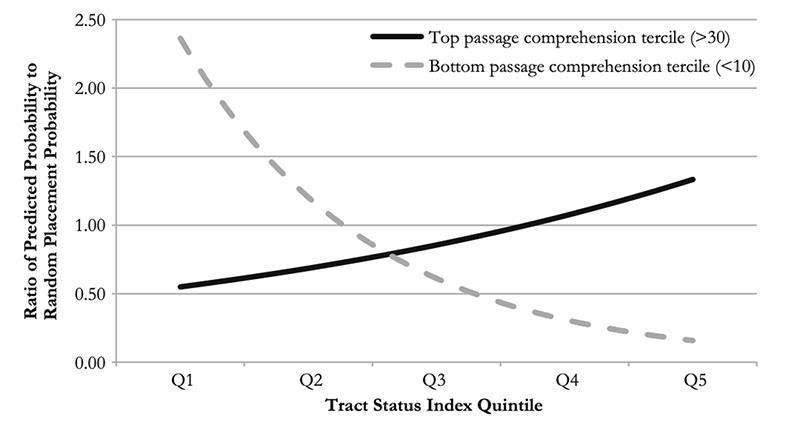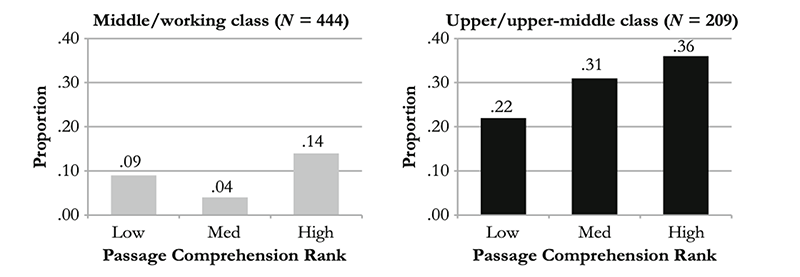How Cognitive Skills Influence Inequality in Contemporary Housing Markets
Which families gain access to neighborhood and school contexts most conducive to their children’s development? Race and class continue to play central roles given the durability of residential and educational segregation. However, the context of urban inequality is changing in ways that might amplify new drivers of neighborhood and school sorting.
In a recently-published paper in Demography based on research funded in part by the Center’s Student Research Support Program, Robert J. Sampson and I argue that with the ascendance of choice-based urban policies and the saturation of housing markets with digital information, parents who more frequently and deftly process large amounts of complex data may have a leg up in accessing high-status neighborhoods and schools. To test this possibility, we used a unique dataset tracking over a decade’s worth of residential histories for a sample of families in Los Angeles County, a more than 4,000 square mile area that is home to more than 10 million people. Our results suggest that even after confirming the important roles of race and class, parents’ cognitive skills independently predicted which families ended up in the county’s most affluent and educated neighborhoods.
This research builds on a large body of work, which has shown that despite the enactment of policies aimed at reducing racial discrimination in the housing market, racial segregation in America’s metropolitan areas remains stubbornly high, and income segregation may be increasing, especially among households with children. While studies have tended to focus on institutional and preference-based discrimination to explain these patterns, they have overlooked other potential factors shaping residential sorting – like cognitive skills – especially in a context of increasingly complex and data-saturated housing markets and school enrollment processes. To clarify, we view cognition not as a genetically transmitted, immutable ability (e.g., IQ) but as acquired knowledge reflecting a variety of social and environmental conditions.
We believe the information explosion saturating urban housing markets and transforming how Americans navigate them may intensify highly-skilled parents’ preferences for neighborhoods they perceive as conducive to their children’s success. The benefits of affluent neighborhoods are more tangible than ever, with popular websites like NeighborhoodScout, Zillow, and Redfin offering constantly proliferating quantitative measures of neighborhood quality (e.g., school quality, crime, and housing value appreciation).
Highly-skilled parents may not only be more likely to seek out and employ this information in decision-making, but may be more likely to secure first-mover advantages in accessing units in high-status neighborhoods – especially neighborhoods on the rise. Just as real estate agents and landlords have long engaged in race- and class-based steering, these important gatekeepers may reward people with perceived market knowledge and deft communication skills by prioritizing them when desirable dwellings in highly-coveted neighborhoods emerge.
To test these possibilities, we developed a fine-grained residential selection model based on an original follow-up of the Los Angeles Family Neighborhood Survey, which provided residential histories for nearly 250 households with children between 2001 and 2012. We linked these histories to information from a variety of other sources including the census and administrative data from local schools. We then developed a discrete-choice model that tests whether parents who score more highly on a reading comprehension test (as a measure of cognitive skills) were disproportionately likely to reside within neighborhoods containing higher-income families and more highly-educated residents.
We find that parents with higher cognitive skill scores are more likely to sort their families into the most affluent and highly-educated Los Angeles neighborhoods – even after accounting for the unique spatial structure of Los Angeles County and confirming the expected effects of race, income, housing market conditions, and spatial proximity on residential selection.
Figure 1: Conditional Predicted Probability of Living in a Given Neighborhood (Ratio to a Random Placement) by L.A.FANS Primary Caregiver Skill Tercile and Neighborhood Socioeconomic Status
One could counter that highly-skilled parents with economic resources are selecting neighborhoods not on the basis of residents’ income and education, per se, but instead on the basis of perceived school quality. We do find evidence in support of this possibility. Among middle and upper-middle class families, parental skills predict selecting neighborhoods with higher-scoring local public schools specifically, rather than neighborhoods with more affluent residents generally. Supplementary analyses show that within this middle/upper-middle class group, more highly-skilled parents are more likely to report neighborhood school quality as a motivating factor in residential mobility behavior.
Figure 2: Proportion of L.A.FANS Primary Caregivers Who Moved Within Prior 5 Years and Reported Access to Good Schools as a Driver of Neighborhood Mobility Decision
We conclude that parental cognitive skills may be an emerging axis along which intergenerational inequality is unfolding. If parents’ skills confer an edge in accessing developmentally-enriching contexts for children, then contemporary residential markets may fuel inequality through this rarely-considered channel. Researchers should examine these possibilities further and test whether skill-based gaps in neighborhood conditions are specific to vast, fragmented metropolises like Los Angeles with formidable informational asymmetries or more generalizable to a wide variety of places.
If such research confirms that skills shape residential sorting, then policymakers may need to revisit the longstanding assumption that choice-based policies (e.g., school and housing vouchers) will effectively reduce inequality. In fact, as I noted in a recent working paper, these types of policies may disproportionately reward parents who were already well-equipped to navigate complex, information rich markets. Government authorities will need to mitigate information gaps that advantage highly-skilled parents in residential and educational selection process.
A recent policy experiment in King County, WA provides a promising blueprint: modest investments in reducing informational barriers among housing voucher recipients (via customized housing search assistance paired with short-term financial support and landlord engagement) dramatically increased the likelihood they selected neighborhoods with high rates of upward mobility. However, while such solutions may be necessary, they may not prove sufficient to reduce the residential housing market’s role as an engine of inequality. As long as race- and class-based preferences shape households’ residential and educational decisions, policymakers may need to consider bolder steps that attenuate these preferences and reduce disparities in the conditions of higher-status and lower-status neighborhoods.



